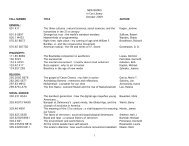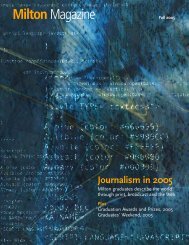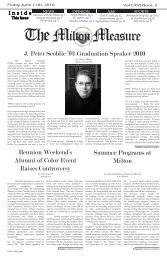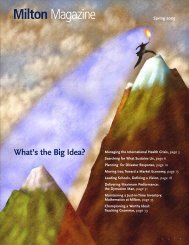Spring 2007 - Milton Academy
Spring 2007 - Milton Academy
Spring 2007 - Milton Academy
- No tags were found...
Create successful ePaper yourself
Turn your PDF publications into a flip-book with our unique Google optimized e-Paper software.
Three who madea differenceSteven Clarke ’93“I had committed to a Ph.D. program inpolitical science and was on my way toCalifornia,” Steven said. “Doug and I hadbeen talking with Deval about his candidacy,and after he announced, he asked me tobe part of the team to get him started.”Steven had completed a master’s in architectureat Columbia and was working inNew York, but several important experiencesworking in Africa—in Namibia,Ghana, and Tanzania—led him to want toadd policy development to his hands-onarchitectural skills.“I have known Deval and Diane [Patrick]since my <strong>Milton</strong> years, and have alwaysadmired their compassion for others andsharp minds. They took Doug, me, andour other friends under their wings andhave been like parents to us ever since,”says Steven. “I knew that if enough peoplehad access to Deval, he would succeed.Most of the staff recognized that the issuewas access; Deval’s personal charisma andideas about policy were a winning combination.I wanted to help.”Steven deferred Stanford for one year,joined the campaign, and served as deputyfinance director (although the campaignportfolios for all the staff were muchbroader than the title indicated) for a criticaleight months; even after he joined hisgirlfriend, who had preceded him toCalifornia, he stayed involved in the campaignand worked on fund raising in SanFrancisco.Doug Chavez ’93, left, and Steven Clarke ’93, right,with a Deval Patrick supporter, Anne UmphreyGovernor Deval Patrick ’74, Doug Chavez ’93,Senator Barack Obama, and MassachusettsLieutenant Governor Timothy Murray“Deval’s finance director, Liz Morningstar(wife of Tim Morningstar, <strong>Milton</strong> <strong>Academy</strong>’93), taught me everything about our viralfund raising strategy and was a great mentorand colleague—she is, in short, a fundraisinggenius. Liz fostered camaraderieamongst the finance staff that was essentialto meeting the challenges of grassrootsfund raising. We grew into a tightteam that grew even tighter and moreeffective with the addition of Janet [Lin],who was a joy to work with.“Building from the few people who agreedto host the first fund-raisers, we workedwith those who surfaced and were thenwilling to hold their own events. I spenttime on fund-raising strategy and on calendaringout the milestones. I learned a lotand was happy that the fund-raising strategycomplemented the overall campaignstrategy,” says Steven.“Deval made a personal commitment torun the campaign in a certain way. Hewanted direct connection to the votingpopulation—as opposed to trying to figureout what people were looking for and talkingto that,” Steven explained. “I felt, alongwith Deval and other people in his personalcircles, disappointed with the state’s trajectory.We heard people complain abouthow distant government felt from the peopleit served.“Deval stayed true to his values, many ofwhich he attributed to his education andhis life experiences. He had learned thatgovernment could play a significant rolein people’s lives, and he wanted people tore-engage in government. Deval was inSudan after Harvard, and what he saw wasemblematic of a developing country:a government so weak that people hadnothing; its weakness was the source ofmany problems, especially a weak economywithout the capacity to grow. He saw adirect connection between a weak governmentand the lack of progress people wereexperiencing.“Deval came from a background of civilrights activism; my parents were active inthat, too. That movement utilized people,citizens; people changed governmentand changed lives. Lately, we have seendramatic examples of incompetencein government, like after HurricaneKatrina—government by cronies, inattentiveto people’s needs. Deval was interestedin changing that.“To his immense credit, Deval refused thesound bite technique. He was adamantand diligent about making sure issueswere not dumbed down or oversimplified.His was less ideological than most races inthe nation. He elevated the dialogue andfocused on the problem. His supportersgrew steadily over time. There wereRepublicans for Deval—all kinds of peoplefor Deval. Many of the people in his campaignwere not career political people.“The people I’ve met here in California arevery interested in this campaign; it wasone of the most grass-roots campaigns inthe history of Massachusetts. People werecoming forward who were displeased withthe direction of the state. For me, that’simportant, to see people making decisionswhere the party affiliation is less important,and they’re paying more attention toissues. I ended up with tremendousrespect for the amount of work and sacrificethat people who run for office gothrough. It was fascinating to see howmuch power is involved in the machinationsof a state.”Doug Chavez ’93Back in New York, catching up on sleepafter a campaign’s worth of deprivation,Doug said that the full historic importanceof the election gradually dawned on him.He found that Black EntertainmentTelevision had named Deval one of fivefinalists for person of the year in 2006; aprofessor at Long Island University, whereDoug’s sister is a student, asked Doug tospeak to his political science class; and hewas asked to speak on a New York radioprogram as well.13 <strong>Milton</strong> Magazine
















